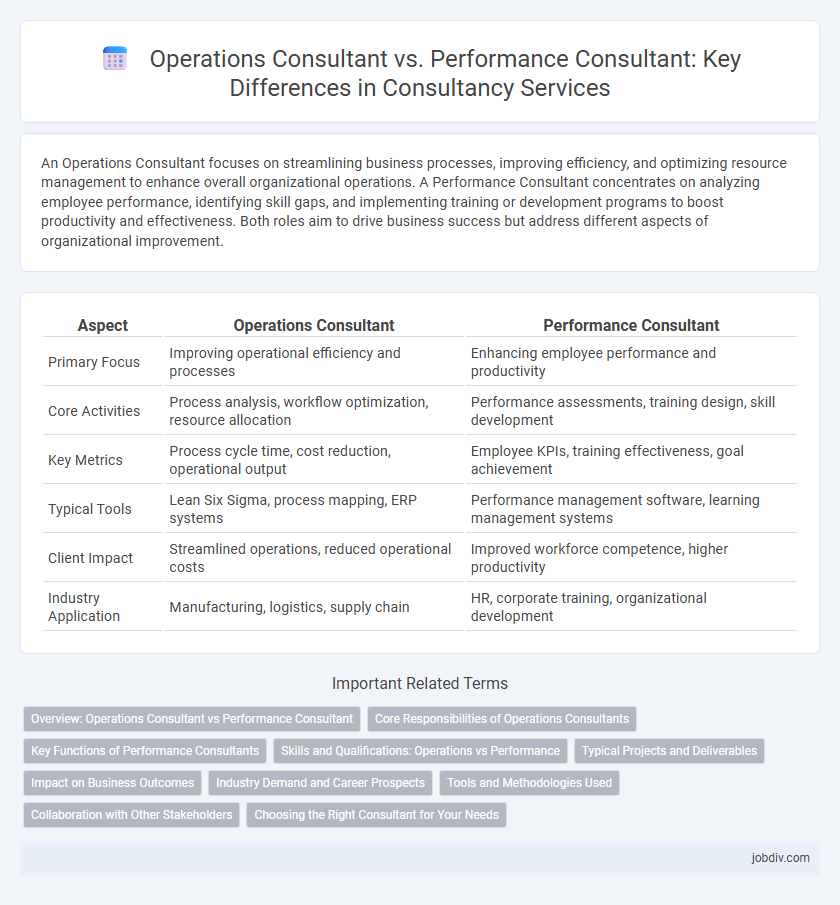An Operations Consultant focuses on streamlining business processes, improving efficiency, and optimizing resource management to enhance overall organizational operations. A Performance Consultant concentrates on analyzing employee performance, identifying skill gaps, and implementing training or development programs to boost productivity and effectiveness. Both roles aim to drive business success but address different aspects of organizational improvement.
Table of Comparison
| Aspect | Operations Consultant | Performance Consultant |
|---|---|---|
| Primary Focus | Improving operational efficiency and processes | Enhancing employee performance and productivity |
| Core Activities | Process analysis, workflow optimization, resource allocation | Performance assessments, training design, skill development |
| Key Metrics | Process cycle time, cost reduction, operational output | Employee KPIs, training effectiveness, goal achievement |
| Typical Tools | Lean Six Sigma, process mapping, ERP systems | Performance management software, learning management systems |
| Client Impact | Streamlined operations, reduced operational costs | Improved workforce competence, higher productivity |
| Industry Application | Manufacturing, logistics, supply chain | HR, corporate training, organizational development |
Overview: Operations Consultant vs Performance Consultant
Operations Consultants specialize in optimizing business processes, supply chains, and workflow efficiency to reduce costs and enhance productivity. Performance Consultants focus on assessing and improving employee performance, organizational culture, and leadership effectiveness to drive sustainable growth. Both roles utilize data analysis and strategic planning but target different aspects of organizational success for comprehensive consultancy solutions.
Core Responsibilities of Operations Consultants
Operations Consultants specialize in streamlining business processes, optimizing supply chains, and improving operational efficiency to reduce costs and increase productivity. They analyze workflows, implement process improvements, and ensure compliance with industry standards to enhance organizational performance. Their expertise in resource management and operational strategy supports sustainable growth and drives measurable business results.
Key Functions of Performance Consultants
Performance Consultants specialize in analyzing organizational processes and employee productivity to identify performance gaps and develop targeted improvement strategies that boost efficiency and achieve business goals. They utilize data-driven methods such as performance metrics analysis, training needs assessments, and behavioral interventions to enhance workforce capabilities and operational outcomes. Their key functions include diagnosing performance issues, designing customized training programs, implementing performance management systems, and measuring the impact of changes on overall organizational effectiveness.
Skills and Qualifications: Operations vs Performance
Operations consultants require strong expertise in process optimization, supply chain management, and data analysis, with qualifications typically including a background in industrial engineering, business administration, or operations management. Performance consultants specialize in workforce development, organizational behavior, and change management, often holding qualifications in human resources, psychology, or performance improvement. Both roles demand excellent problem-solving abilities and effective communication skills, but operations consultants focus more on system efficiencies while performance consultants emphasize human capital enhancement.
Typical Projects and Deliverables
Operations consultants primarily focus on projects involving process optimization, supply chain management, and cost reduction, delivering detailed workflow analyses, efficiency improvement plans, and implementation roadmaps. Performance consultants typically handle projects related to employee productivity, leadership development, and organizational effectiveness, providing performance gap assessments, training program designs, and metrics-driven improvement strategies. Both roles deliver actionable insights tailored to enhance organizational outcomes, yet operations consultants concentrate on system-level efficiencies while performance consultants target human capital and behavioral enhancements.
Impact on Business Outcomes
Operations consultants optimize internal processes, supply chains, and resource allocation to improve efficiency and reduce operational costs. Performance consultants focus on enhancing employee productivity, leadership development, and organizational behavior to drive measurable outcomes in revenue and customer satisfaction. Both roles contribute to business success by targeting different levers: operations through system improvements and performance through workforce effectiveness.
Industry Demand and Career Prospects
Operations Consultants specialize in streamlining business processes and improving operational efficiency, driving high demand in manufacturing, logistics, and supply chain sectors where companies seek cost reduction and productivity enhancements. Performance Consultants focus on optimizing workforce productivity and organizational effectiveness, attracting growing interest from industries prioritizing talent management and employee engagement to boost competitive advantage. Career prospects for Operations Consultants are robust in industries facing complex operational challenges, while Performance Consultants enjoy expanding opportunities in firms emphasizing human capital development and performance metrics.
Tools and Methodologies Used
Operations consultants specialize in process optimization employing tools such as Lean Six Sigma, value stream mapping, and workflow automation software to enhance efficiency and reduce costs. Performance consultants utilize data analytics platforms, Balanced Scorecard frameworks, and KPIs tracking systems to measure and improve organizational effectiveness and employee productivity. Both consultants apply change management methodologies but differ in their emphasis on operational processes versus performance metrics.
Collaboration with Other Stakeholders
Operations consultants collaborate closely with process owners, supply chain managers, and IT teams to streamline workflows and enhance operational efficiency. Performance consultants engage with HR, finance, and leadership stakeholders to align metrics and drive accountability for organizational goals. Both roles require strong cross-functional communication to ensure integrated solutions and sustainable results.
Choosing the Right Consultant for Your Needs
Operations consultants specialize in optimizing business processes, supply chain management, and operational efficiency, making them ideal for organizations seeking to streamline workflows and reduce costs. Performance consultants focus on enhancing employee productivity, talent development, and organizational effectiveness, suited for companies aiming to boost workforce performance and align skills with strategic goals. Selecting the right consultant depends on whether your primary need is improving operational systems or elevating employee and team performance.
Operations Consultant vs Performance Consultant Infographic

 jobdiv.com
jobdiv.com